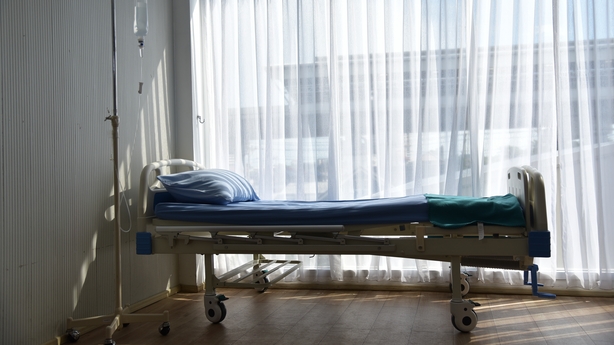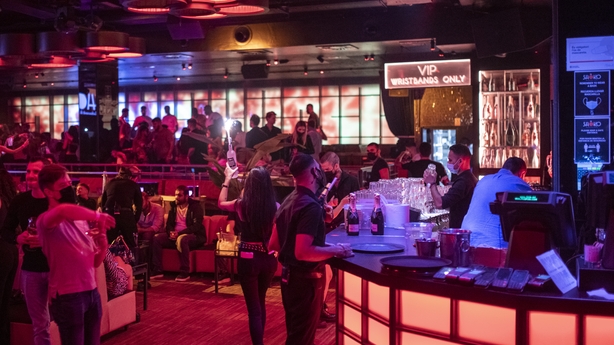Austria is placing millions of people not fully vaccinated against the coronavirus in lockdown from tomorrow.
It comes as the country seeks to deal with a surge in infections to record levels and the growing strain on intensive-care units, the government said.
Europe is the epicentre of the Covid-19 pandemic again, prompting some governments to consider re-imposing unpopular lockdowns.
Austria has one of the continent's highest infection rates, with a seven-day incidence of 815 per 100,000 people.
"We are not taking this step lightly but it is necessary," Chancellor Alexander Schallenberg told a news conference announcing the new measure.
From tomorrow, the unvaccinated can only leave their homes for a limited number of reasons such as going to work or shopping for essentials.
Roughly 65% of Austria's population is fully vaccinated against Covid-19, one of the lowest rates in western Europe.
Many Austrians are sceptical about vaccines, a view encouraged by the far-right Freedom Party, the third biggest in parliament.
The measures tomorrow will extend those brought in a week ago which banned the unvaccinated from places including restaurants, hotels, theatres and ski lifts.
While the Netherlands is dealing with its surge in cases by imposing a partial lockdown that applies to all, Austria's conservative-led government wants to avoid imposing further restrictions on those who are fully vaccinated.
"In reality we have told one third of the population: you will not leave your apartment anymore apart from for certain reasons. That is a massive reduction in contacts between the vaccinated and the unvaccinated," Chancellor Schallenberg said.
In Germany, the federal government and leaders of Germany's 16 states are due to meet next week to discuss tightening measures.
Germany has already classified Austria as a high-risk area, meaning people arriving from there have to go into quarantine, a blow to Austria's winter tourism industry.
Targeted measures have recently been introduced in Australia, where 83% of people aged 16 and above have been fully inoculated.
Some states have mandated vaccinations for some occupations and barred the unvaccinated from activities such as dining out, leading to demonstrations.
Singapore, where 85% of the population has been fully vaccinated, has said those who remained unvaccinated by choice would have to foot their medical bills from next month.
Austria's lockdown, which does not apply to the under-12s or people who have recently recovered from Covid-19, will initially last 10 days, Health Minister Wolfgang Mueckstein said.
Many officials, including within Chancellor Schallenberg's conservative party and the police, have expressed doubts this lockdown can be properly enforced as it applies to only part of the population.
Interior Minister Karl Nehammer said there will be thorough police checks.
Three dead in fire on coronavirus ward in Bulgaria

Three patients have died in a fire that broke out this morning on a coronavirus ward in a hospital in southwest Bulgaria.
The three male patients were all ill with Covid-19 and died on the fourth floor of a hospital in the city of Sliven, the head of the local rescue services, Vladimir Demirev, told Bulgarian television.
Six other patients on neighbouring wards had to be evacuated.
The incident occurred as the EU member headed to the polls for the third time this year on Sunday amid the deadliest wave of Covid-19 yet in the country.
"The most likely cause of the fire was a lit cigarette of one of the patients," the Bulgarian health ministry said in a statement.
Bulgaria's hospitals, frequently run down, are currently overwhelmed by the number of coronavirus infections.
With only just over 23% of the total population of 6.9 million people fully vaccinated, Bulgaria has the lowest vaccination rate across the European Union.
After two previous elections in April and July returned fractured parliaments where parties failed to cobble together a coalition, the new election is not expected to bring about a stable government.
The current interim administration has failed to impose stricter measures and prevent new infections and deaths from spiralling.
Last week in neighbouring Romania, two Covid-19 patients also died in a hospital fire.
Spain's bars face alcohol shortage as Covid curbs lift

Bars and nightclubs across Spain have struggled to stock their shelves with popular alcoholic drinks since Covid-19 restrictions on social life were fully lifted last month.
This is due to supply chain issues caused by the pandemic.
This is raising concerns in a country where social life is concentrated outside of the home, and big groups often meet up for tapas or dinner followed by rounds of drinks.
"The shortage is not generalised, but is concentrated on some brands. The problem is that these are brands people are very attached to," said Roberto Ucelay, the manager of the Los Olivos Beach Resort in Tenerife, part of Spain's Canary Islands.
Among the popular names affected are Beefeater gin, Absolut vodka and Patron tequila.
The shortages are due to the global shipping crisis, sparked by an uptick in demand from China and the United States which "affects all international trade", Spain's association of spirits makers, Espirituosos Espana, said in a statement.
Suppliers have struggled with shortages in bottles and cardboard boxes needed to package alcohol, as well as a lack of drivers, containers and trucks to ship it.
"It is not a problem of the availability of products, it is a problem of delivery," said a spokesman for France's Pernod Ricard, the world's number-two spirits maker.
Other European nations like Britain have also been hit by alcohol shortages, but in Spain the problem is compounded by the country's consumption patterns, he said.
Bars and restaurants account for almost half of all alcohol sales in Spain, compared to just one-fifth in France, where supermarkets account for the bulk of sales, the spokesman said.
When business picked up in Spain after virus restrictions were removed, this more complicated supply chain "had to get up and running again" - a process that takes time, he said.
